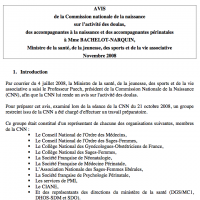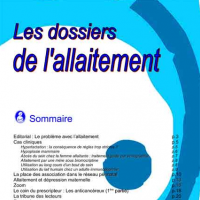Beverley Beech, AIMS UK
 Doulas – AIMS supports a woman’s right to choose a doula
Doulas – AIMS supports a woman’s right to choose a doula
From the beginning of time women have assisted women to give birth. When doctors took over control of birth and insisted that all women had to give birth in hospital they imposed conditions on who should or should not attend.
In the UK a woman has a right to have with her whomsoever she chooses, and if she chooses to pay a doula to give her the support she needs in labour then she has every right to do so.
Doulas do not replace midwives, they offer emotional support and companionship at a time when women should not be left alone, unless they choose to do so. Unfortunately, modern obstetrically dominated care frequently leaves women alone and this lack of support contributes to the high levels of intervention and caesarean sections.
Doulas can also help support the father or the baby, look after other children – make the tea and hundreds of other things that fall into the realm of ‘mothering’ the mother and supporting the whole family unit. Ina May Gaskin has highlighted the importance of the emotional state of the birth supporters and we know from experience that a nervous husband can have a very negative affect on the progress of labour.
There is a considerable amount of research indicating the benefits of continuous support during childbirth and it is unfortunate that midwifery organisations in France are so short sighted that they are targeting doulas instead of welcoming them as potential supporters.
Undermining women’s right to choose their birth companion is deplorable.
Beverley Lawrence Beech, Hon Chair, Association for Improvements in the Maternity Services, UK
Relevant Research references:
Postpartum depression: Bridging the gap between medicalized birth and social support. Goldbort, J. (2002) International Journal of Childbirth Education Vol 17(4):11-17.
Having a baby is generally considered one of the happiest times in a woman’s life. However, approximately 10% of women experience a downward spiralling event known as Postpartum Depression. Research demonstrates that early screening, intervention, and treatment can prevent this malady from having a devastating effect on the woman, her family and the community. Social support is one of the many key contributing factors in how a woman interprets her birthing experience, with adverse birthing experiences contributing to postpartum depression. In this paper, the author examines the role of the doula, and how her support during the perinatal period may contribute to a positive outcome in a medicalized birthing arena, and as a consequence of a doula’s support, postpartum depression may be minimized or prevented.
Benefits of massage therapy and use of a doula during labor and childbirth.
Keenan P. Altern Ther Health Med 2000 Jan;6(1):66-74 Potomac Massage Training Institute, USA.
This article reviews the most recent literature on touch support and one-to-one support during labor and childbirth. The positive and negative aspects of the traditional birth attendant are presented. Research in one-to-one care and touch support during labor is examined with respect to husband/partner, nurses, nurse-midwives, and doulas (trained labor attendants). According to recent studies, women supported by doulas or midwives benefit by experiencing shorter labors and lower rates of epidural anesthesia and cesarean section deliveries. Also, a smaller percentage of their newborns experience fetal distress and/or are admitted to neonatal intensive care units. Women whose husbands or partners massage them during labor experience shorter labors. Nursing one-to-one support results in no significant obstetric outcomes. Antenatal perineal massage was found to reduce the rates of tears, cesarean section, and instrumental deliveries. Research in perineal massage during labor has shown no benefit.
The obstetrical and postpartum benefits of continuous support during childbirth.
Scott KD, Klaus PH, Klaus MH. J Womens Health Gend Based Med 1999 Dec;8(10):1257-64 Division of Public Health, County of Sonoma Department of Health Services, Santa Rosa, California 95404, USA.
The purpose of this article is to review the evidence regarding the effectiveness of continuous support provided by a trained laywoman (doula) during childbirth on obstetrical and postpartum outcomes. Twelve individual randomized trials have compared obstetrical and postpartum outcomes between doula-supported women and women who did not receive doula support during childbirth. The results of these twelve trials strongly suggest that doula support is an essential component of childbirth. A thorough reorganization of current birth practices is in order to ensure that every woman has access to continuous emotional and physical support during labor.
Effects of psychosocial support during labour and childbirth on breastfeeding, medical interventions, and mothers’ wellbeing in a Mexican public hospital: a randomised clinical trial. Langer A, Campero L, Garcia C, Reynoso S. Br J Obstet Gynaecol 1998 Oct;105(10):1056-63 The Population Council, Regional Office for Latin America and the Caribbean, Colonia Coyoacan, Mexico DF, Mexico.
Psychosocial support by doulas had a positive effect on breastfeeding and duration of labour. It had a more limited impact on medical interventions, perhaps because of the strict routine in hospital procedures, the cultural background of the women, the short duration of the intervention, and the profile of the doulas. It is important to include psychosocial support as a component of breastfeeding promotion strategies.
Continuous emotional support during labor in a US hospital. A randomized controlled trial. Kennell J, Klaus M, McGrath S, Robertson S, Hinkley C. JAMA 1991 May 1;265(17):2197-201 Department of Pediatrics, Case Western Reserve University, Cleveland, OH.
The continuous presence of a supportive companion (doula) during labor and delivery in two studies in Guatemala shortened labor and reduced the need for cesarean section and other interventions.
Continuity of caregivers for care during pregnancy and childbirth (Cochrane Review).
Hodnett, E.D. (2003) The Cochrane Library, Issue 3, 2003. Oxford: Update Software. Abstract here.
Continuous support for women during childbirth (Cochrane Review).
Hodnett, E.D, Gates, S, Hofmeyr, G.J, Sakala, C. (2003) The Cochrane Library, Issue 3, 2003. Oxford: Update Software. Abstract





